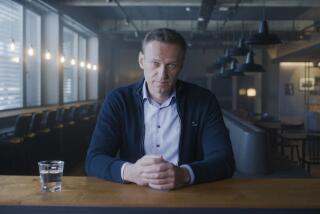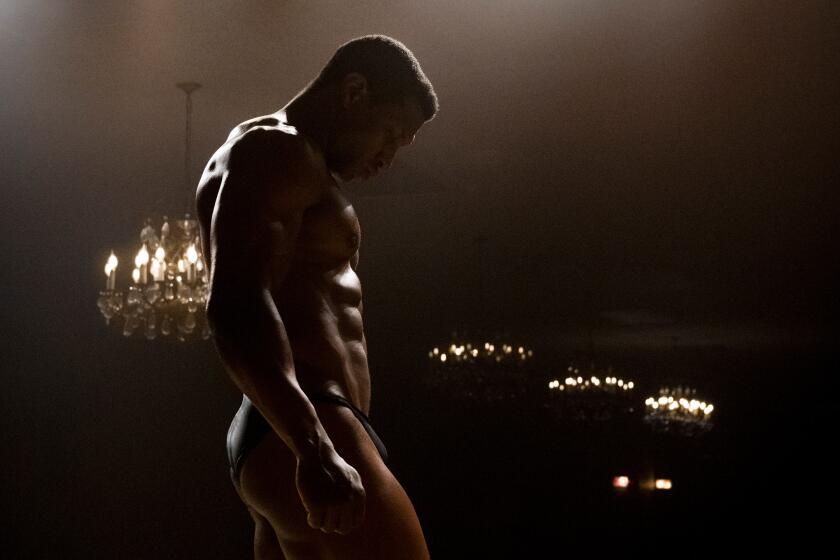Welcome Rays From ‘Sun’ : Director Nikita Mikhalkov Hopes Oscar Will Boost Russian Film Industry
- Share via
For Russia’s Nikita Mikhalkov, the third time was the charm.
He walked away with this year’s foreign film Oscar for “Burnt by the Sun”; two of his films having been nominated previously.
Dressed in a white summer suit, Mikhalkov spoke in halting English of the importance of truth--but that truth was nothing without love.
Accompanying him to the Shrine Auditorium stage was his 8-year-old daughter, Nadia, with whom he co-stars in his film. He praised her affectionately and humorously as “the only actress I never had any problems with.”
Speaking through a translator, Mikhalkov said recently of winning the Oscar: “For me it’s a great honor, and I think it is very important for my country today when our film industry is in crisis and needs to have some stimulus. I feel very happy to be able to do something for my national film industry.
“I value the academy’s choice because I know what the situation was around my film,” Mikhalkov added, referring to the fact that at the time his was the only one of the five nominated films that had not been released in the United States (it opened here Friday). Further, it was seen only at the two official academy screenings; his American distributor, Sony Pictures Classics, was unable to schedule additional screenings because its release version, edited by Mikhalkov himself, is 18 minutes shorter and because the academy did not make its Russian print available to Sony.
For nearly 20 years Mikhalkov has been a major filmmaker of international renown. His “Dark Eyes” (1987), derived from Chekhov and starring Marcello Mastroianni as a man transfixed by an early love, brought him his first best foreign film Oscar nomination. “Close to Eden” (1992), a lament for the loss of living close to nature, was also nominated.
Mikhalkov, 49, is a master at evoking the leisurely rural world of Chekhov, and that is the mood of “Burnt by the Sun.” This film, however, is set in the dark year of 1936 when Stalin was cracking down cruelly on many prominent figures in Soviet society--simply because of their prominence. Mikhalkov has cast himself as a robust hero of the Bolshevik revolution whose idyllic existence in his suburban Moscow dacha is shattered in the course of a single summer afternoon.
“The Bolsheviks created their own sun, and then they were burned by it,” Mikhalkov said in an interview at a friend’s Beverly Hills estate several days before the Oscars. “If you’re born blind or are in prison, that’s your life, you may not know anything else. But if you go blind or are arrested, this is a big tragedy because you have experiences to compare it with. That is the essence of the tragedy of the ‘30s. The sun was rising, the flowers were blooming, but the terror was there behind the backs of the people all the time.”
Although a work of fiction, “Burnt by the Sun” has brought Mikhalkov accolades for its authenticity. “I was showing the film in Riga,” he said. “There were 3,000 people in the audience. I stood behind the screen, and when it was over there was absolute silence--as if the theater were empty. Nobody moves, nobody stands up, then the lights go up. I’m going out on the stage in this silence when I see a little old lady slowly moving toward me. She became the focus of everyone’s attention. I lifted her up on the stage, and then she hugged me and couldn’t let go. She exclaimed, ‘Nadia--she is me!’ Three-thousand people stood up and cheered.”
Mikhalkov, long a glamorous figure on the film festival circuit, comes from a distinguished family of poets, writers and artists--his older brother, Andrei Konchalovsky, is also an esteemed director. But not everyone in his family fared so well during the Soviet era.
“My uncle was drafted in 1941 and captured by the Germans on the first day of the war. He escaped from the Germans 12 times, was shot by a firing squad twice, and finally escaped--only to be immediately sent to a prison camp by Stalin. My father looked for him for six years and was able to get him out when he found him. Whatever a human being is supposed to feel in the course of his life, my uncle got crammed in those years.” (Both Mikhalkov’s father and uncle are still living.)
*
Mikhalkov said the rural area outside Moscow actually experienced a rash of fireballs and these natural phenomena recur throughout the film like a reflection of the sun caught in a mirror. “They’re a symbol of the Bolsheviks burning everything that moves,” he said. “Another symbol is that truck driver who keeps asking how to get to this place, and everybody points him in a different direction. That’s Russia for you.”
Currently, he’s resisting accepting acting offers for Nadia, but his three older children are already following in his footsteps. His son Stepan, 28, is a partner with the son of veteran director Sergei Bondarchuk in a successful company producing music videos and commercials. Anna, 22, and Artiom, 18, are enrolled in the Moscow Film School. Mikhalkov lives in Moscow with his wife, Tatiana, a former model.
“Yes, of course, I’ve been tempted by Hollywood offers,” he acknowledged. “. . . But I don’t want to push everybody aside to get a project just so I can say I’m a Hollywood director. If I could do a movie in my own country, and if a Hollywood company decided it wanted it, I would be happy to do it. But I can shoot only what I want to shoot.
“I have many plans, and one of my projects actually could be for Hollywood. Right now I have seven projects, two of them theatrical. My projects are like pelmeny , which is like ravioli, in a pan of boiling water. I’m just waiting for one of them to come to the surface.”
More to Read
Only good movies
Get the Indie Focus newsletter, Mark Olsen's weekly guide to the world of cinema.
You may occasionally receive promotional content from the Los Angeles Times.









